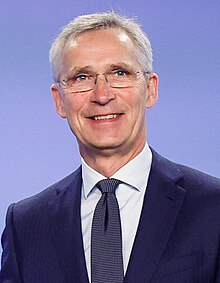
Jens Stoltenberg
Secretary general of NATO since 2014 / From Wikipedia, the free encyclopedia
Dear Wikiwand AI, let's keep it short by simply answering these key questions:
Can you list the top facts and stats about Jens Stoltenberg?
Summarize this article for a 10 year old
Jens Stoltenberg (Norwegian: [jɛns ˈstɔ̀ɫtn̩bærɡ]; born 16 March 1959) is a Norwegian politician who has served as the 13th secretary general of NATO, since 2014.[1][2] A member of the Norwegian Labour Party, he previously served as the 34th prime minister of Norway from 2000 to 2001 and again from 2005 until 2013.
Jens Stoltenberg | |
|---|---|
 Stoltenberg in 2024 | |
| 13th Secretary General of NATO | |
| Assumed office 1 October 2014 | |
| Deputy | Alexander Vershbow Rose Gottemoeller Mircea Geoană |
| Preceded by | Anders Fogh Rasmussen |
| 34th Prime Minister of Norway | |
| In office 17 October 2005 – 16 October 2013 | |
| Monarch | Harald V |
| Preceded by | Kjell Magne Bondevik |
| Succeeded by | Erna Solberg |
| In office 17 March 2000 – 19 October 2001 | |
| Monarch | Harald V |
| Preceded by | Kjell Magne Bondevik |
| Succeeded by | Kjell Magne Bondevik |
| Leader of the Opposition | |
| In office 16 October 2013 – 14 June 2014 | |
| Prime Minister | Erna Solberg |
| Preceded by | Erna Solberg |
| Succeeded by | Jonas Gahr Støre |
| In office 19 October 2001 – 17 October 2005 | |
| Prime Minister | Kjell Magne Bondevik |
| Succeeded by | Erna Solberg |
| Leader of the Labour Party | |
| In office 10 November 2002 – 14 June 2014 | |
| Deputy | Hill-Marta Solberg Helga Pedersen |
| Preceded by | Thorbjørn Jagland |
| Succeeded by | Jonas Gahr Støre |
| Minister of Finance | |
| In office 25 October 1996 – 17 October 1997 | |
| Prime Minister | Thorbjørn Jagland |
| Preceded by | Sigbjørn Johnsen |
| Succeeded by | Gudmund Restad |
| Minister of Industry and Energy | |
| In office 7 October 1993 – 25 October 1996 | |
| Prime Minister | Gro Harlem Brundtland |
| Preceded by | Finn Kristensen (as Minister of Industry) |
| Succeeded by | Grete Faremo (as Minister of Petroleum and Energy) |
| Member of the Norwegian Parliament | |
| In office 1 October 1993 – 30 September 2017 | |
| Deputy | Anders Hornslien Inger Lise Husøy Ragnar Bøe Elgsaas Truls Wickholm Håkon Haugli |
| Constituency | Oslo |
| Personal details | |
| Born | (1959-03-16) 16 March 1959 (age 65) Oslo, Norway |
| Political party | Labour |
| Spouse | |
| Children | 2 |
| Parent(s) | Karin Heiberg Thorvald Stoltenberg |
| Alma mater | University of Oslo (Cand.oecon.) |
| Signature | |
| Website | Official Facebook Official Twitter |
| Military service | |
| Allegiance | |
| Branch/service | |
Born in Oslo as the son of the prominent diplomat and politician Thorvald Stoltenberg and politician Karin Stoltenberg (née Heiberg), Stoltenberg attended Oslo Waldorf School and Oslo Cathedral School before graduating with a degree in economics from the University of Oslo in 1987. During his studies, he worked as a journalist, and led Labour's youth wing from 1985 to 1989.
He started his career in government as a state secretary in the Ministry of the Environment in 1990 and was elected to the Storting in 1993. He served as Minister of Industry and Energy from 1993 to 1996 and Minister of Finance from 1996 to 1997. He was prime minister from 2000 to 2001, was leader of the Labour Party from 2002 to 2014, and served as prime minister for a second time from 2005 to 2013. The following year, he was named as the 13th secretary general of NATO, and his term was subsequently extended four times by the NATO heads of state and government.
Stoltenberg has been described as a cautious politician, belonging to the right-wing of social democracy.[3] When he became prime minister in 2000, he was portrayed as the "Norwegian Tony Blair",[4] and his policies were inspired by Blair's New Labour agenda; his first government oversaw the most widespread privatisation by any Norwegian government to that date.[5] Stoltenberg said he was both inspired by and wanted to learn from Blair's policies.[6][7] As the second longest-serving high-ranking official in NATO history, Stoltenberg has worked to expand the alliance into Eastern Europe and to strengthen the alliance's military capabilities in response to the Russo-Ukrainian War, and his tenure coincided with the largest increase in NATO defense spending since the Cold War.